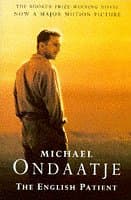
Michael Ondaatje, The English Patient
Value For Money
Michael Ondaatje, The English Patient
When you purchase through links on our site, we may earn an affiliate commission. Here's how it works.

User Reviews
Value For Money
I Found This Book Very Hard Work, Partly Due To Th
I found this book very hard work, partly due to the author's style and also as I had seen the film first. I loved the film I must say, and can happily sit down and drift into it's beauty again. Like most films 'based on the book', there are many changes. As much as i tried to disassociate the two genres, i desperately wanted to find some of the beauty of the film, but i didn't realise how much of a distraction this would be, as i tried to enjoy the book.
The book is about love first and foremost. We find each of the main characters in a villa in Italy during ww2. The Germans having withdrawn, delayed the advancing troops by placing mines in everything that could be of use. Somewhere behind the advance, a war ravaged young nurse and a bed-bound burns victim, find temporary solace in each other. Hana, imprisoned within herself, laboured over battle victims and harboured their souls in her loneliness. The English patient lays dying, almost motionless. Living hard on his memories and morphine dreams. Together their existence feeds the other. Hana consuming his passionate love story for her own, and he, longing for the freedom she evades. They are joined by a young Indian sapper called Kip, and a former friend and spy looking for a German collaborator. Both of these characters are intrinsic to the plot, and have intent to thicken the love story theme. The book places much more emphasis on the relationship between the sapper and Hana, the comforting couple, although i thought it's course and conclusion made it rather contrived. The sappers thorough character story, as good as it is, brings him only a hardship and companionship purpose in the story. Caravaggio also has a rather unnecessary family history, which has no purpose in the plot, and serves only to preempt some notional love for Hana. I feel this highlights the problem with the book's story. The sapper relationship delivers little more than friendship, and Caravaggio's unrequited love seems to have been tacked on as a last thought. To me, these are rather bland story ideas which could be better.
The main problem I had with the book was overcoming the author's writing style, notably in the first half of the book. He seemed desperate to create so many images in a sentence, that it became hard to follow. You couldn't read and allow your mind to imagine a scene, he would keep on it until it became a list of metaphors. It made it intolerable at times, and slowed the pace of the story while my mind computed data. Rather annoyingly, he changed his writing style to a more simplified one when describing the sappers army training, presumably done to indicate the complexity of his individual characters.
Overall. It's very much an accomplished and supremely complex book, a benchmark to other writers i should imagine. As a reader however, it left me fairly cold.
Q&A
There are no questions yet.